Noor, the Missing Refugee Girl: A Play
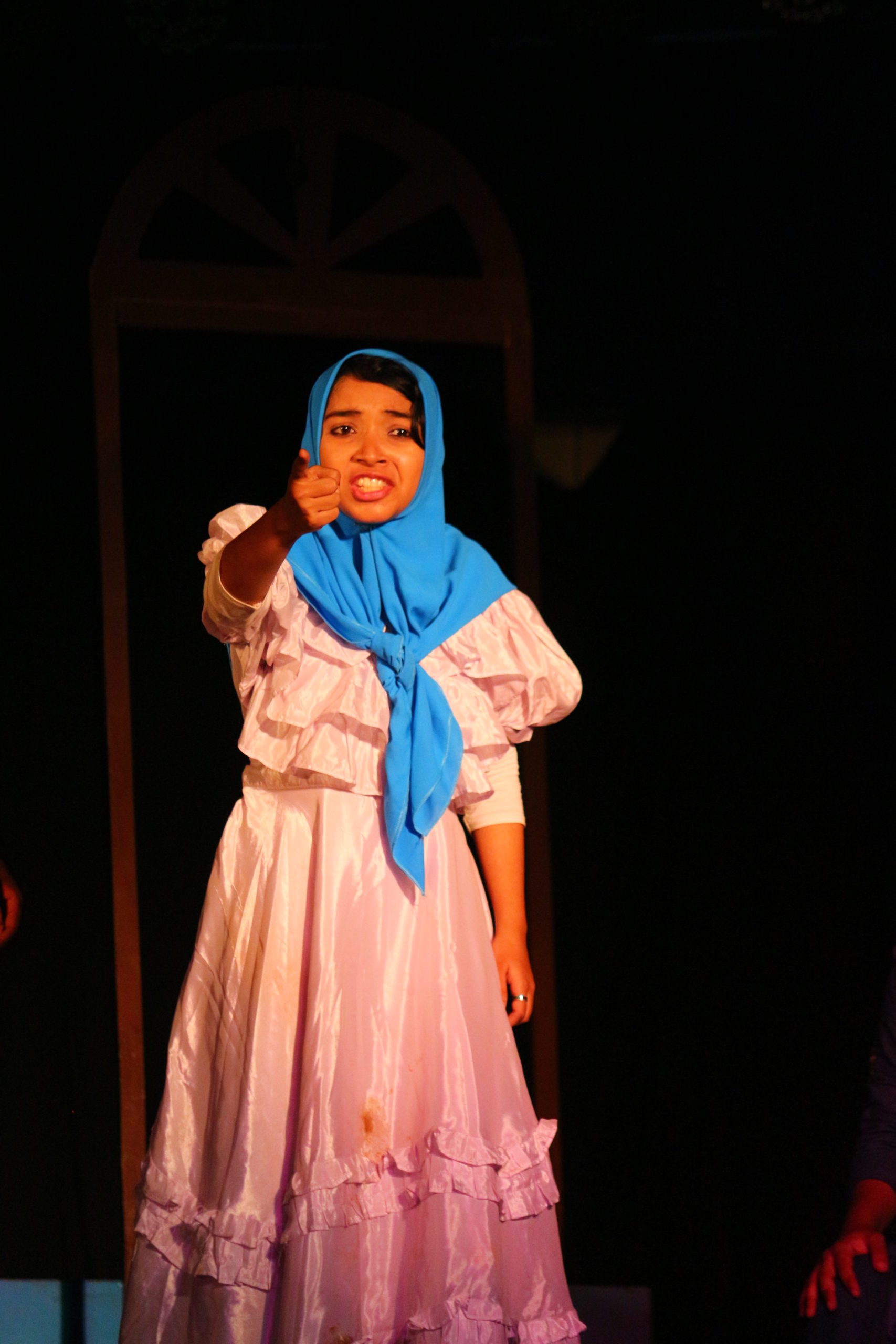
This is an independent adaptation of AKBAR S AHMED’s highly allegorical play NOOR in the context of the Syrian refugee crisis. This was written and directed for SIAS Drama Club, of SAFI Institute of Advanced Study, for performing at the Calicut University art festivals in Summer 2017. In the original text, a girl is abducted by the invading US army in Baghdad and three brothers are desperately in search of her. Three distinct, exclusive and conflicting routes to find her. One takes a secular, modernist way by utilizing the existing system, the other one a Sufi mystical path and the third one a violent militant mode. A story close to the pressing ideological conflicts and the deep sense of loss the Muslim world goes through on a daily basis. However, here the entire story has been forced to reduce into a single act, in order to make it fit for a 30 minutes performance. All important characters have been kept, names changed for practical conveniences, some minor modifications here and there. Sadly, as we couldn’t find the wonderful original script in any of the book shops in Calicut during the rehearsal camp, the dialogues in this text are newly written. However, you are recommended to read the original script.
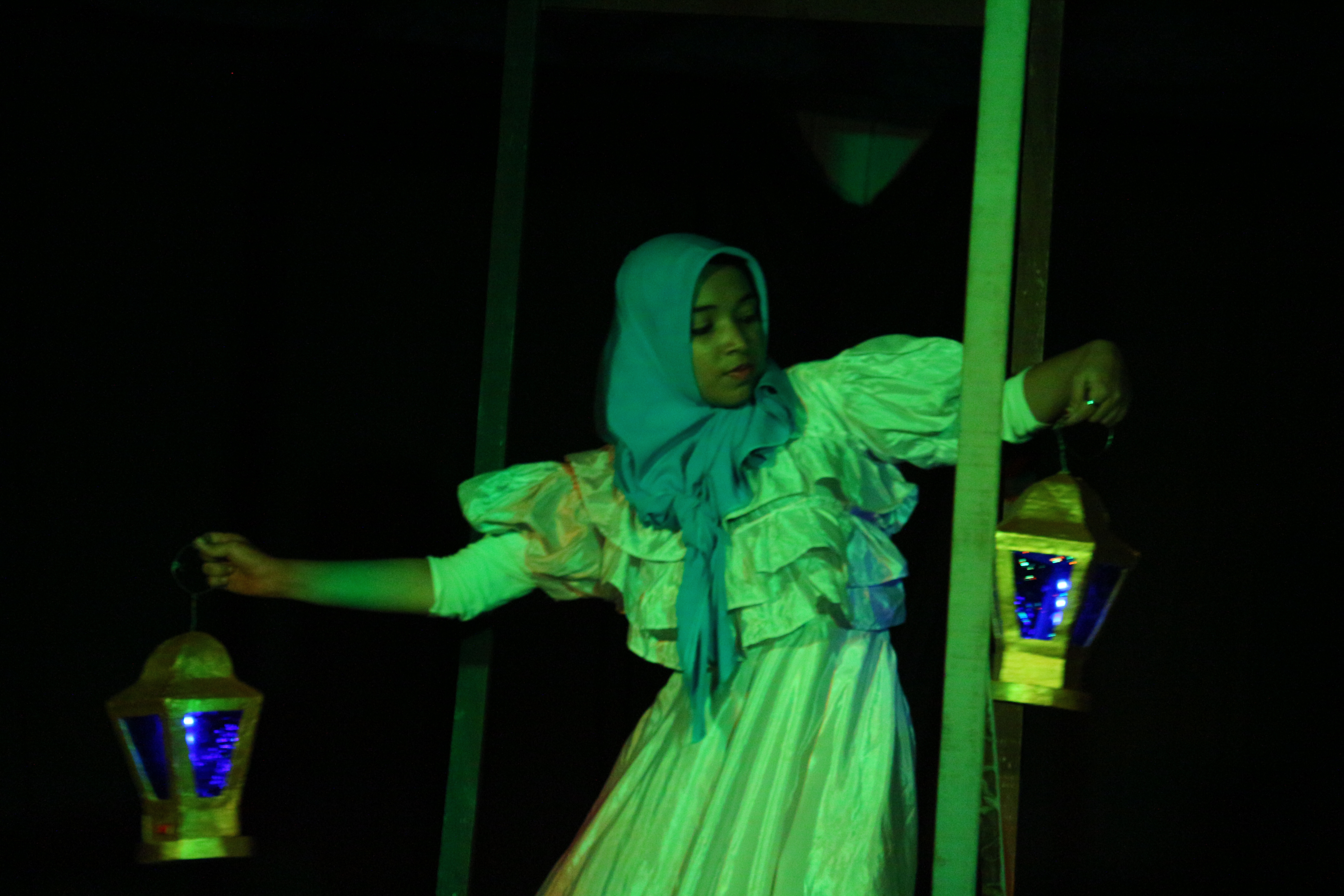
“A people who have no land to refuge themselves. No saviours to look for, no doors to knock at.” Farzeen as Noor.
NOOR, THE MISSING GIRL
Written and directed by MUHAMMED NOUSHAD. Photographs by MAHESH G.S.
Scene 1
Night. The stage opens to a rough, turbulent sea. Huge waves ferociously tossing a small boat here and there. The boat is packed with frightened refugees who are are being thrown from one side of the deck to the other, repeatedly. The refugees are Arabs as it appears from their costumes. They struggle hard not to fall down and support each other. The storm gets more violent and a huge wave sweeps them over and a teenage girl, the protagonist, called Noor, falls off to the depths of the sea. Everyone on the deck, her family, relatives and other passengers shout “Noor” and offer possible help to get her back on the boat. But, in vain. Waves take her away from the boat.
(Lights off)
Scene 2
A sea shore. Midnight.
Three brothers who have lost their sister Noor, their blind father and the aged aunty have somehow reached a sea shore which is guarded by a gun-wielding white soldier. It is still midnight, and the soldier is sleepy; taking advantage of his slumber, they hide behind a few rocks on the beach, and slowly touch the mainland. They are relieved to have reached, but afraid of getting caught. To their shock, they come across the dead body of a very small boy and collapse one by one. The soldier is still asleep.
(Lights off)
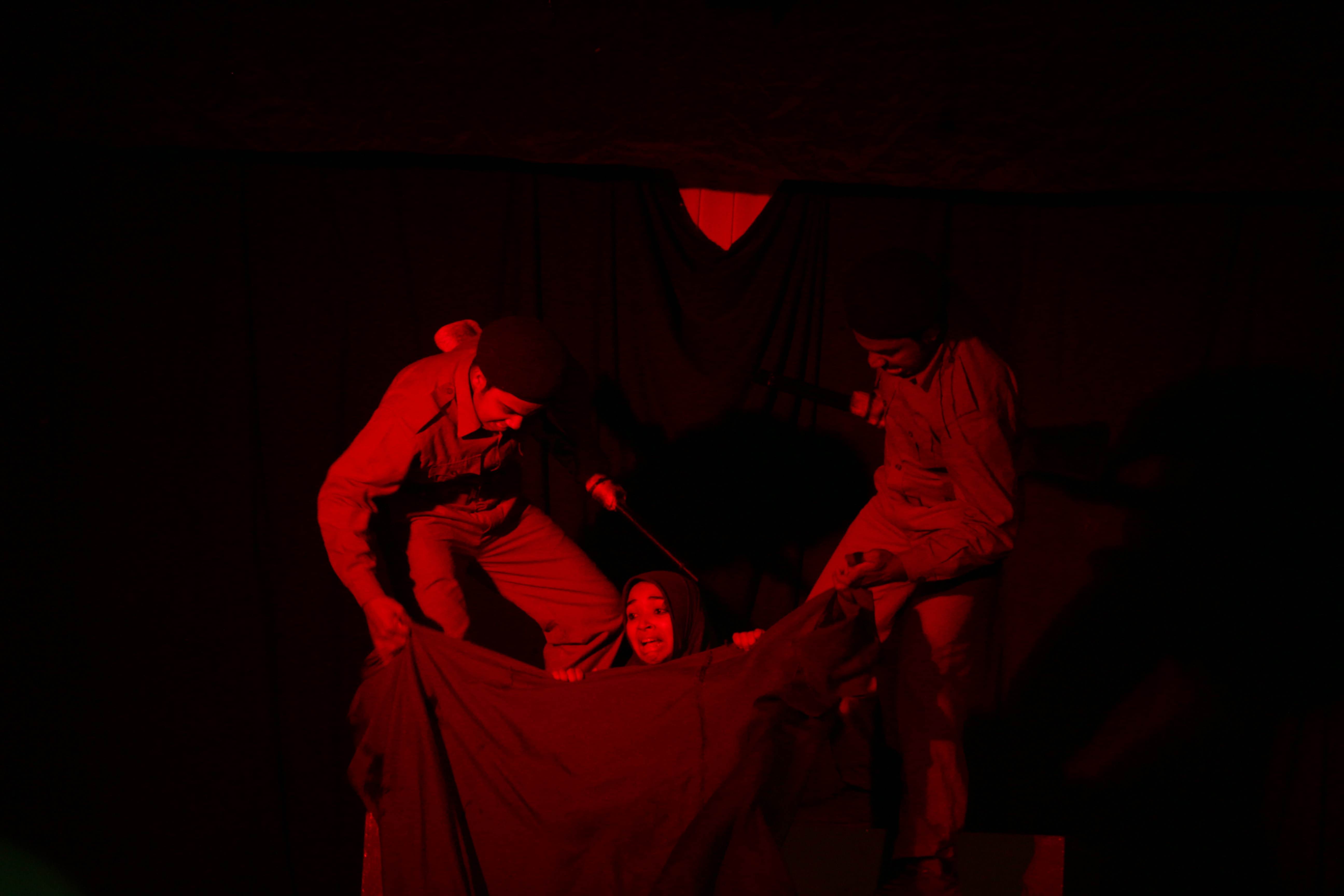
“The soldiers are merciless. Go and find her.” Dilshad and Shamil as soldiers.
Scene 3
Another sea shore. Daybreak.
Finally, Noor, the missing girl reaches the sea shore, all wet, tired, hungry and exhausted. Refugees from her own country have reached the same place before her and they have been partially rehabilitated in tents by concerned organisations and the local administration. In her battered shape, she tries to seek help from her fellow-people but nobody hears her feeble voice.
However, she is well-noticed by two white soldiers who decide to rape her and kidnap her. Her weak resistance brings no result and she is brutally dishonoured and abducted.
(Lights off)
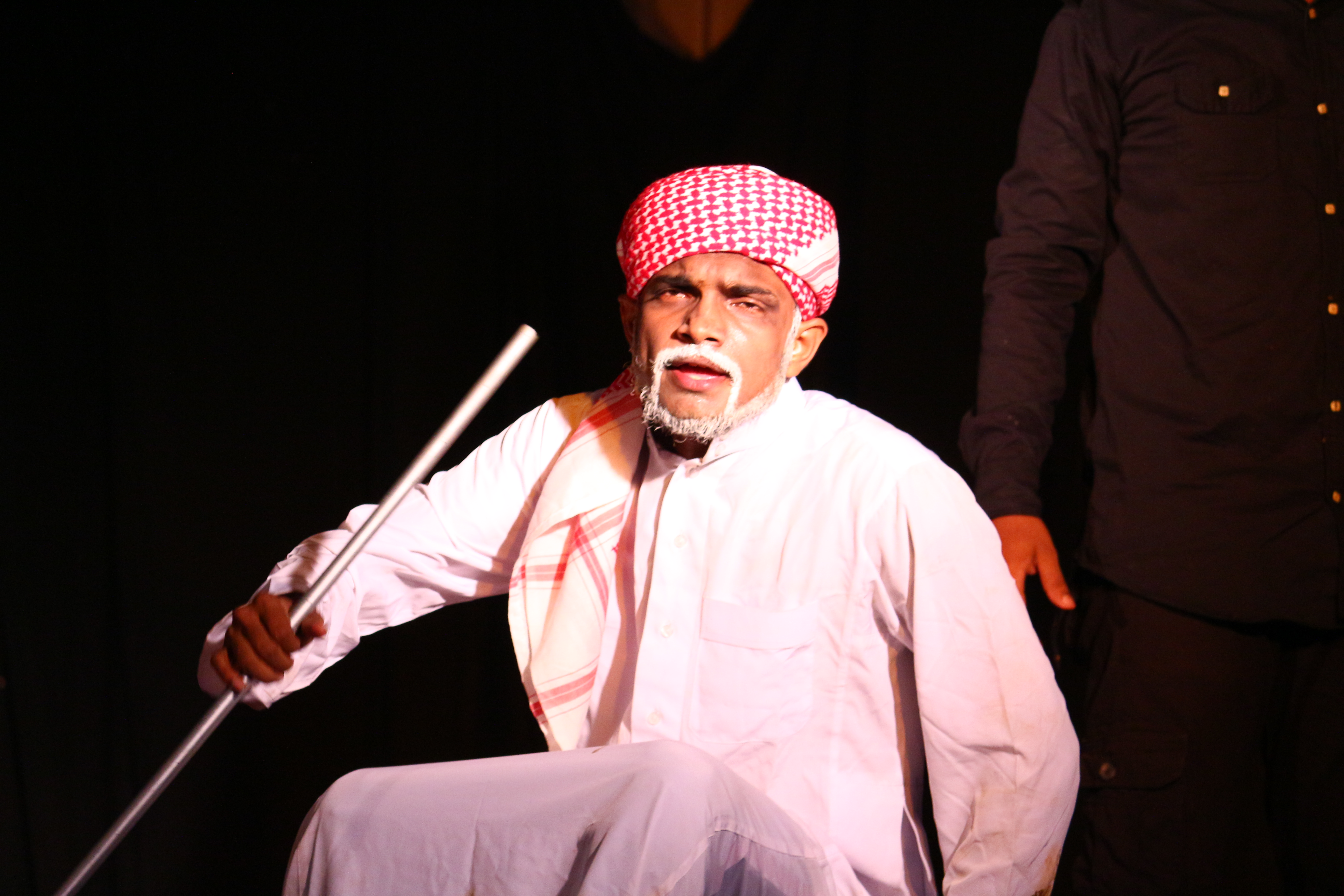
“Why do you stutter when you speak? Are you hiding something from me?” Nizam as the blind father.
Scene 4
Sea shore near the refugee camp. Night.
The three brothers – Yusuf, Omer, Wahid and Yusuf – are in search of their sister Noor, the missing refugee girl. All of them are educated and come from an elite, urban background, though currently share a tent in the migrated city, for survival. Yusuf is the youngest and inclined towards a militant version of Islam. Omer is elder to him, a liberal secular modernist who believes religion is a private affair. Wahid, the eldest, is a practising Sufi who believes no issue can be solved until the believers purify themselves through a close connection with Allah. What unites them is their love for Noor, for whom they are ready to go any extent.
They run searching for her on the beach, in the light and in the dark, holding a torch in their hands, and finally meet up in front of their tent, all tired and distressed.
Omer : Who will tell this to father? Wahid, you are the eldest, I think you should.
Wahid : But I can’t tell him the truth and I don’t want to lie. I have never lied to him. I can’t afford to do that.
Yusuf : What does he think now? Is he aware of this?
Omer : He has some doubts. It’s natural. I told him she is with our aunt.
Wahid : Do you think he would believe it? He will immediately ring her up.
Yusuf : And she would tell him the truth.
Omer : She wouldn’t tell him the truth. She knows how to help us. I‘ve explained her everything.
Wahid : (Upset) You even made that old lady a liar?!
Omer : This is war! In war, everything is fair.
(Wahid obviously doesn’t buy this idea)
Yusuf : (Equally worried) But, how long he would believe this lie? How long she is going to help us? One day the truth will come out. Do you have any serious scheme to bring our sister out?
Omer : Yes, of course. I am her brother.
Wahid and Omer (together) : We are all brothers.
Omer : Then tell me: (turning to Wahid, the sufi) what are you going to find our sister?
Wahid : I would meet my spiritual master and I will ask him to pray for her. He is so close to God and she will come back without any harm… And what is your plan, brother?
Omer : (Not happy with his idea) I have connection with the embassy here. I think they will do something. Yusuf, what is in your head?
Yusuf : (Angry and determined) I am planning an ambush, an attack with my trained team; and I would rescue her.
Wahid : (Shocked) That is a dangerous thought. You may also die. They will kill you. This is not our country.
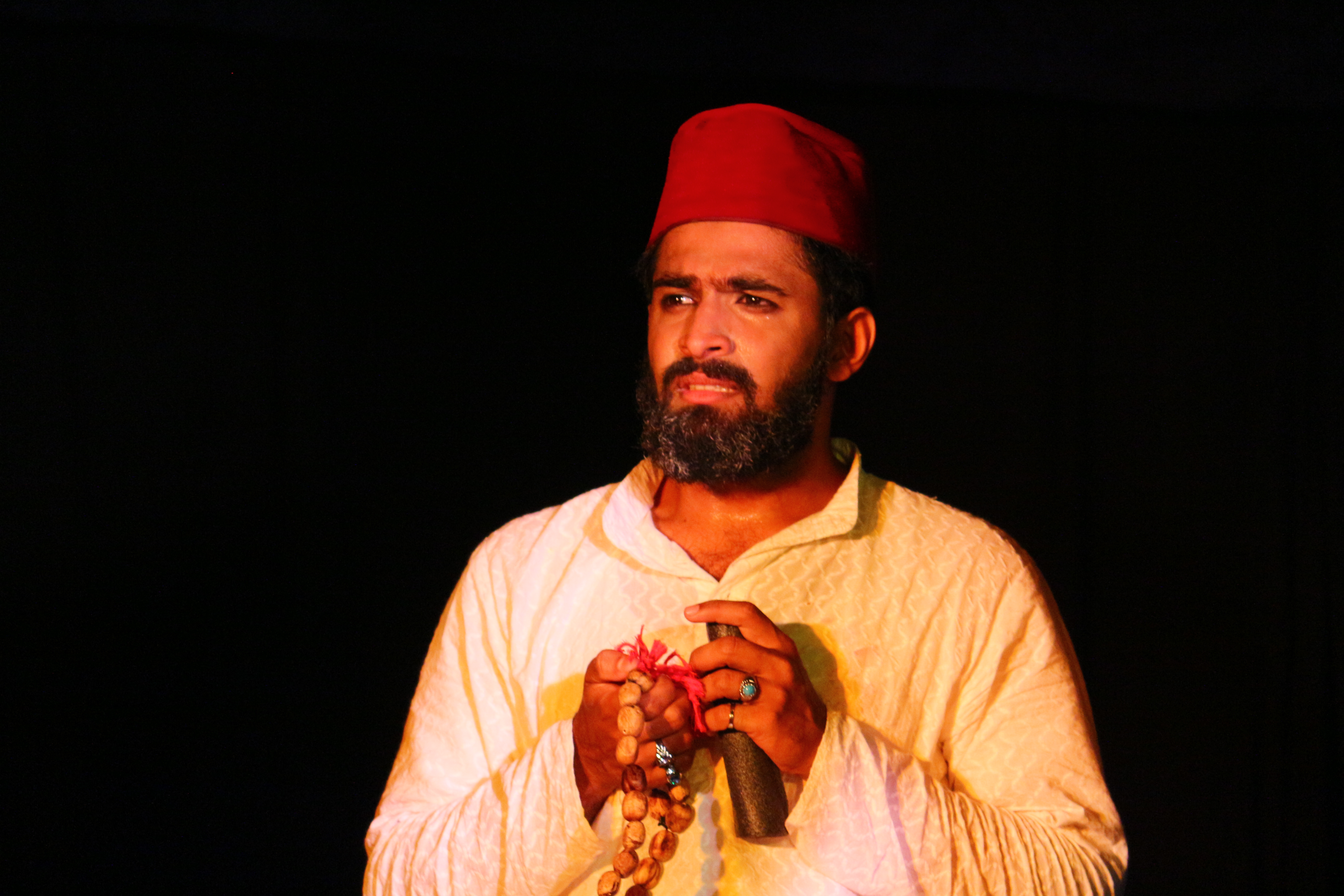
“It has been the same tragic story because we have forgotten God.” Sabeeh as the Sufi brother.
Yusuf : The brave die only once and I am not afraid of that.
Omer : (Trying to demoralise) Yusuf, our father is already worried. Do you think he can hear the news of his two children missing?
Yusuf : Endless children are already missing. Innumerable people. So, we have to do something practical other than meeting stupid politicians and spiritual masters.
The father, Mahmood, enters from behind. He is blind. He is not aware of the current situation of Noor.
Wahid : Stop, our dad is coming.
Mahmood : What were you quarrelling about? I heard a fight, what is it about? Where is my Noor? Where has she gone?
The brothers look at each other, without knowing what to reply.
Omer : (Lacking confidence) She is in another refugee camp; perhaps, she went to meet her aunty.
Mahmood : Which camp?
Omer : I think in the another end of the city.
Yusuf : Is she alone? Is somebody with her? And you guys are quarrelling each other! Go and bring her back.
Wahid : (Confused of what to say) Dad, she will find her way back herself.
Mahmood : (Surprised) By herself? You know there is very heavy patrolling. And you think a little girl can walk back home safely? Aren’t you ashamed of saying this, Wahid?
Yusuf : We can’t go, Dad! The soldiers are particularly angry with the males.
Mahmood : No! They are particularly looking for women. If you are a coward, tell me you don’t have enough courage. I will go and bring her back.
Wahid : (Trying to pacify) No dad, you can’t go; you are a patient. You need rest, and you need medicines.
Mahmood : (Very much angry and sad) Do you know which medicine I am taking? Only Noor knows! (Starts leaving to find her)
Yusuf : No dad, it’s not easy, this is not our country.
Mahmood : (Shouts) Bring back my daughter. I want to see her. Now!
Omer : (Stuttering) She is… she is… with our aunty.
Mahmood : Aunty? My sister Fatima? I want to see her; I want to talk to her.
Wahid : No… it’s… not… it’s not easy to reach there.
Mahmood : (Almost getting the reality) Why do you stutter when you speak? Are you trying to hide something? Are you lying? Tell me the truth, where is Noor, where is my daughter?
(Lights off)
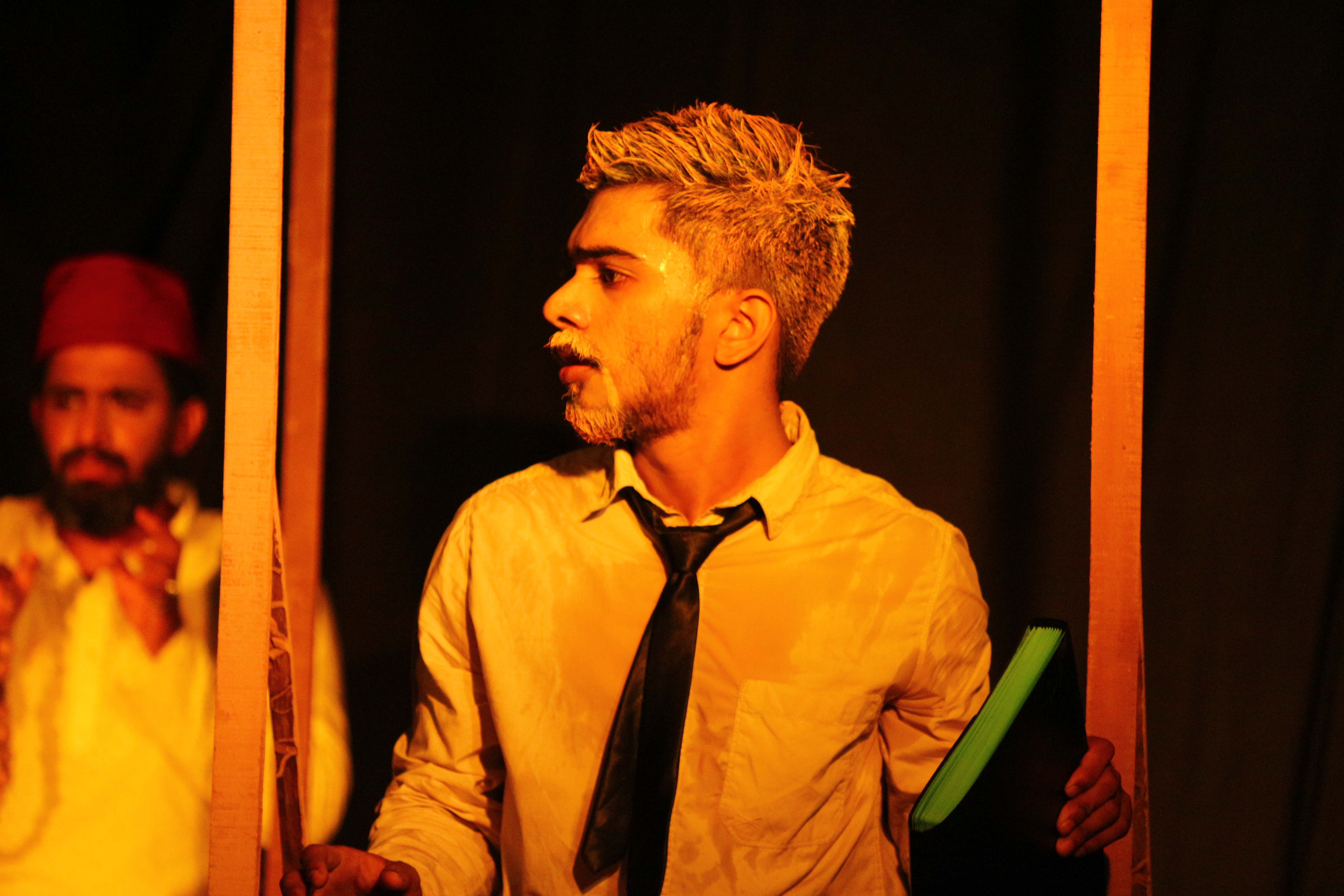
“We have to do campaigning, lobbying. We have to use the system.” Yahya as the secularist brother.
Scene 5
A surrealistic representation of the ongoing search by three brothers. Day and night. All seasons. The space could be the refugee camp or the entire city, or their own emotional landscapes. Wahid, the Sufi; Omer, the secularist and Yusuf the militant are seen pacing across the stage, carrying life-size doors in their hands, looking through them often. The doors are identical and typically reminds of Islamic architecture. They walk and place the doors on different positions when they talk.
Yusuf : Noor… Where are you?
Wahid : Where have you gone?
Omer : Come back to us… Oh Noor…
All of them (together) : Where are you?
The search, in different paces, continue and the same dialogue and chorus repeated. The positions of the doors change, the pace and moods and body languages of the brothers vary. Finally, at three differnt levels, the doors are placed and the brothers settle down right behind them. When they settle down, Omer has files in his hand, Yusuf wields a gun, and Wahid is counting dhikr on a tasbih (rosary).
Wahid : I don’t think we can ever find her, Oh God…
Omer : We have to find her. We can’t give up. We don’t have an option.
Wahid : We have been searching for her all day and night. I am afraid if she is alive.
Yusuf : God forbid. What the hell is going on in your mind? How can you say that?
Wahid : It’s fate. It’s destiny. (looking sharp into the sea, sky, audience)
This darkness is our destiny.
Yusuf : You may be so tired to think so. I can’t afford to lose my sister. I know what to do.
Omer : (With hope) Tomorrow, there is a protest march. I will meet the minister. They will do something to find her.
Yusuf : (Loudly) The minister? That corrupts bullshit? Do you seriously believe so?
Omer : (Infuriated) What else should we do?
Yusuf : (Resolved) We have to fight. Those bloody rascals have shed much of our blood. They have raped many of our sisters. It’s not just our sister. You know that.
Omer : (Perplexed) You are mixing up things. The rulers of this country, at least some of them, are trying to help us. We have to trust them. We have to use them.
Yusuf : We have to kill them. We have to fight back.
Wahid : (Trying to console) Brothers… You can’t fight with each other. We have to pray to God. It’s only He who can change all these.
Omer : God is not going to change any of this.
Wahid : Allah has His own rules. He helps those who help him. We have to pray to God. We have no other option. (Wahid offers his tasbih to Omer who refuses it)
Omer : We have to do campaigning, lobbying. We have to use the system.
Yusuf : We have the option of a gun, a bomb, a suicide attack.
Wahid : This is not our land. This land has accommodated us. You know, we are refugees in this country.
Yusuf : All land belongs to Almighty. We have been made refugees; and throughout history, it has been the same tragic story. There should be an end. We will fight back and win the battle.
Wahid : It has been the same tragic story because we have forgotten God. We have disconnected ourselves from Him. We have to practice love and compassion and purify our souls. The path ahead is to go back to Him.
Yusuf : You and your stupid ideas. It’s people like you who have betrayed the community. And more critically, you people have damaged the community and its culture. You will be paying the price for that.
Saying this, escalating tension amongst them and almost at the verge of fight, the brothers exit. Noor enters dancing with lanterns in her both hands. Her dance is slow, profound and painful.
(Lights off)
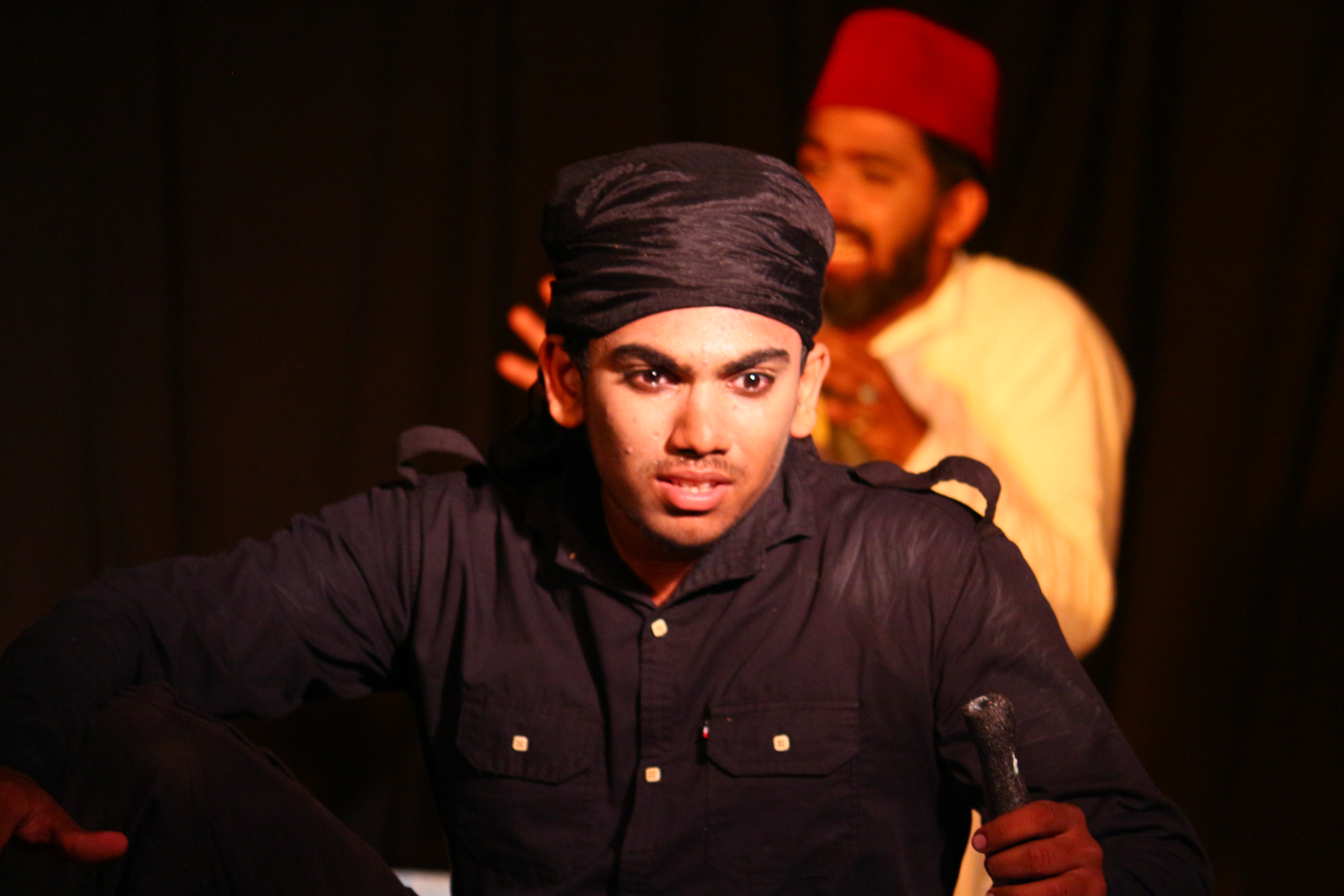
“We have the option of a gun, a bomb, a suicide attack.” Thenfiq Rahman as the militant brother.
Scene 6
A tent in a refugee camp. The blind father Mahmood and his aged sister Fathima are in a conversation.
Mahmood : There is something that I can’t fully believe. All three of them have three different stories to tell and it is so unconvincing. You know I miss Noor so badly. I am sure you can’t lie to me. Somehow, all of them have been telling me that she is with you and that is how this blind old man has come to meet you again. Tell me Fathima… Where is my daughter?
Fathima : Brother, she can’t leave you alone. You have to trust us, all of us. She will soon return to you. She is not a kid. She must have places to go. She was here. She is here. She is with you, in your heart, in your memory.
Mahmood : No, I want to see her. I want her to recite me from the Quran. Ever since her mother left, she has been taking care of me so well. I often felt that she is not my daughter, but I am her son. Fathima, you can’t lie to me. Tell me where she actually is.
Fathima : (Worried, confused) You asked Wahid, Yusuf and Omer, right? May be she want to meet some of her friends. May be she is in some other refugee camps.
Mahmood : (Sad and disappointed) So, you were also lying to me? All of you have been lying to me! I doubted; still, I had trusted you Fathima. You should have told me the truth before.
Fathima : In the times of the war, truth is the first casualty, as they say. There are certain lies which are very sacred.
Mahmood : (Annoyed) Sacred lies? You, liar. I didn’t expect this from you. You liar!!
Fathima : (Calm, resolved) You know brother; the rudest way of lying is lying to oneself. You are just worried of Noor. Think of me, I have to convince my son Rahman as well.
Mahmood : Does he know about her missing?
Fathima : I think he does. Even if he doesn’t know now, he would know it tomorrow. I am afraid if he would accept her as his bride.
Mahmood : (Taken aback) Why not? They love each other right? Has their love been so shallow and pretentious?
Fathima : But people tell stories; almost everyone thinks that Noor has lost her honour. The soldiers are so merciless. (almost breaks down)
Wahid, the sufi brother enters, tasbih in his right hand.
Fathima : Wahid, do you have any news?
Wahid : Noor will come back.
Fathima : How come you know? Who told you?
Wahid : I met my Sufi master. He is so pious and close to Almighty; he assured me that Noor would return.
Mahmood : (Ridiculing) This guy is good for nothing!
Omer, the secular brother enters, with some official documents in his hand.
Fathima : Omer, do you have anything pleasant and hopeful to say?
Omer : I am coming from the embassy. I met some diplomats and even the minister. They are looking in to the case.
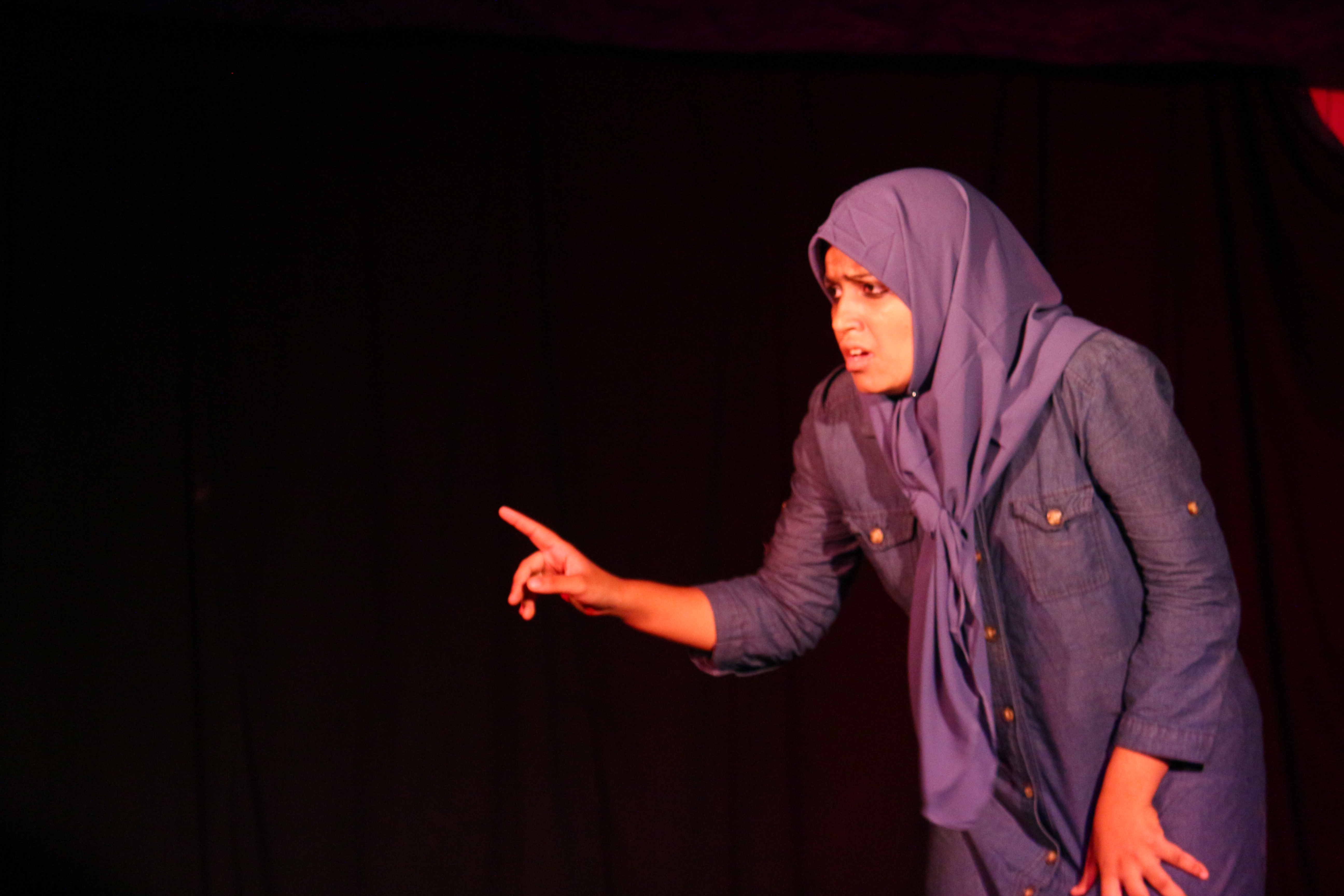
“The rudest way of lying is lying to oneself” Shamla as Fathima.
Fathima : (Losing her temper) But how long? How long they keep saying the same thing?
Yusuf, the militant brother enters, holding a gun.
Yusuf : Yes, you are right aunty. All these promises are fake. I have a very concrete plan to get her back. My organization has chocked out a plan to blow up their military basis.
Mahmood : (Shaken by the idea) What is wrong with you? Are you mad, Yusuf? What would you get by exploding bombs over there? Will they send Noor back to us?
Fathima : Stop all these stupid conversations. I have something important to tell you. Now everybody acknowledges the fact that our Noor is missing! And you know… oh God! Rahman is waiting for the wedding date!
Mahmood : Yes, Noor would come back. As soon as Rahman gets leave, we should decide the date for marriage. (feeling pain on his chest and appearing more tired)
Fathima : It’s not about his leave. It’s about his will. I am afraid if he would agree to marry her any longer…
Wahid : Why aunty? He loves her so much.
Omer : Their love story had been envied upon by everyone in the town.
Yusuf : They would make a wonderful couple.
Fathima : I wish they could! But you know, Rahman is very rigid about all this. I don’t think he would reconcile himself with Noor’s present situation.
Mahmood : You should talk to him and we could convince him. He is such a nice boy and he can’t let her down. I can’t even bear the thought of Rahman abandoning my Noor.
Mahmood gets intense chest pain in the middle of the last sentence and almost falls down while finishing it; his sons and sister support him.
(Lights off)
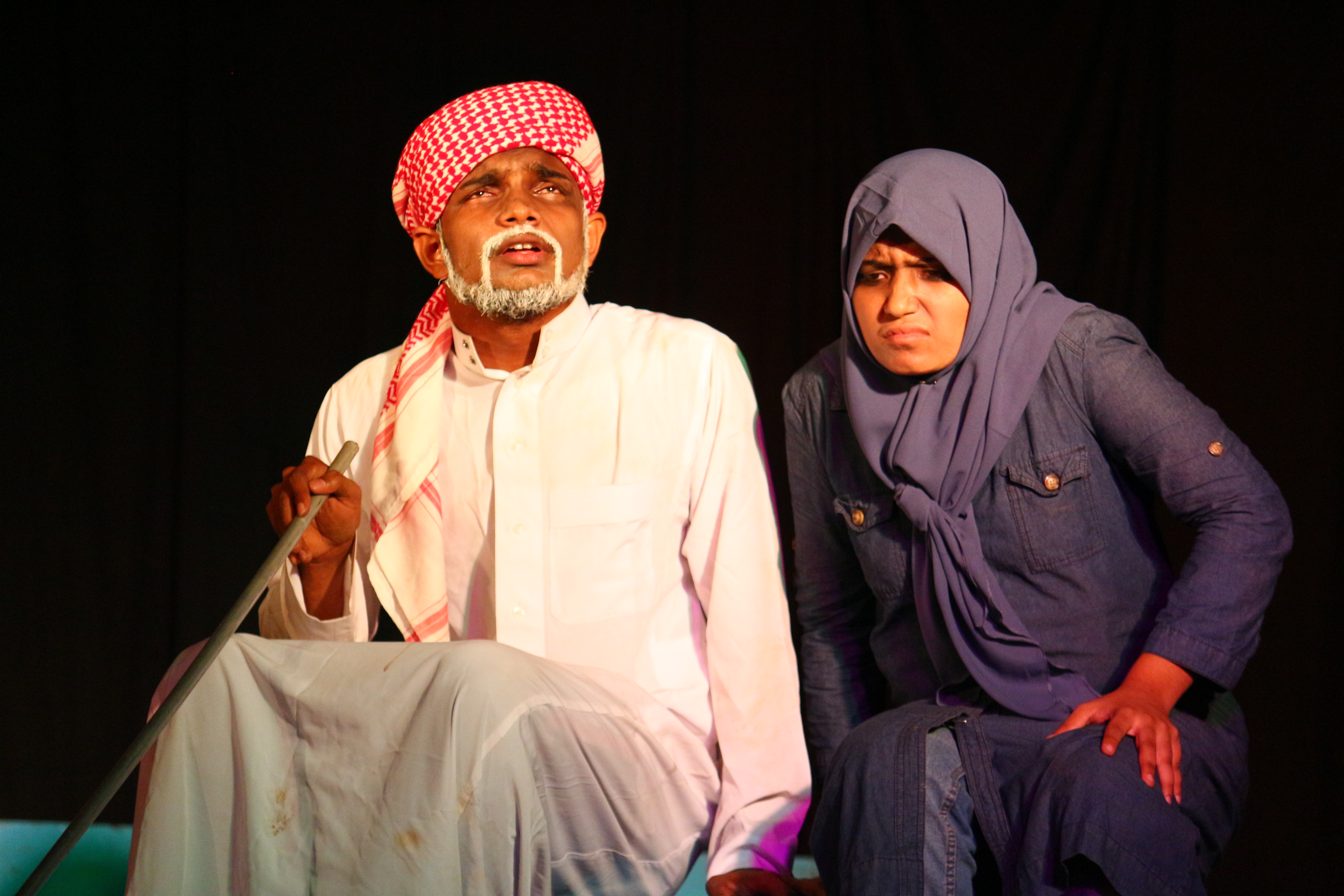
“I am afraid if he would agree to marry her any longer…”
Scene 8
The same tent. Evening. Mahmood and Fathima are asleep on two beds. The doors through which the brothers entered and used for searching have been visibly placed. Noor enters through the doors. She is down with distress but has a strange sense of strength and charm. She calls her dad.
Noor : Dad.. Dad…
Mahmood first, and then Fathima hears her. They both get up. Mahmood quickly finds his way towards her and Fathima almost runs to hug her.
Mahmood : Noor! Thank God, you have come back. Where have you been… Thank god, my child is here with me again! I have been waiting for you, my heart was aching, my soul was suffering, I thought you wouldn’t come back before I leave. Now, I could return to Allah peacefully. I have seen you, my child!
Fathima : Noor! How badly we missed you. Are you hurt? Are you good? Noor, did they do anything wrong to you? Did they harm you?
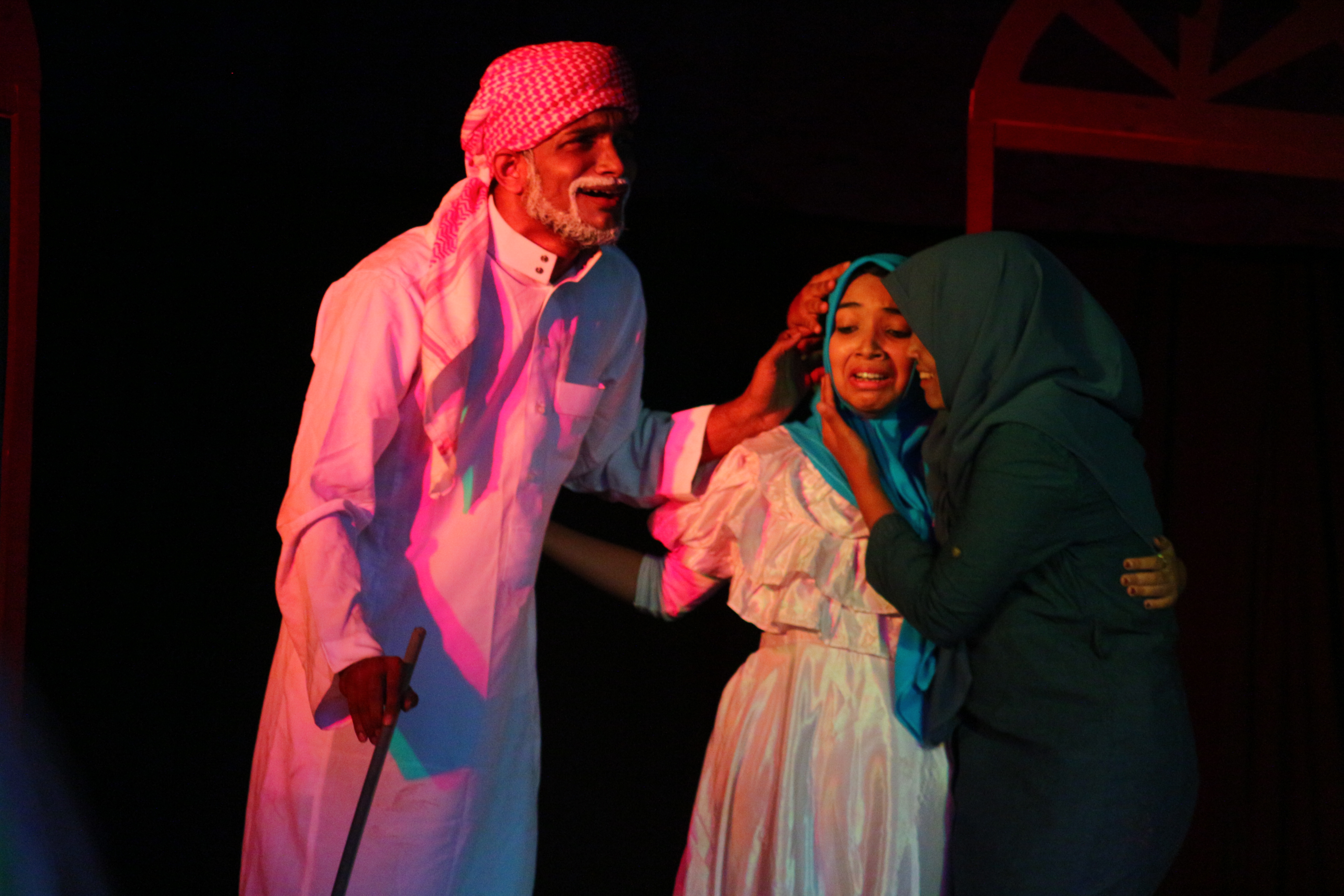
“I have seen the lighthouse of hope.”
All three brothers enter together through three doors – obviously elated of Noor’s return.
Brothers : Noor, you are back with us!
Omer : There is no place wherein we didn’t reach searching for you..
Wahid : There is no prayer hat I missed seeking for you..
Yusuf : There is no door that I missed to knock, in order to find you…
Noor : (Not pleased by their gestures) And what did you find? Where did you reach? Did you find your sister, any of those sisters? Could those prayers open your eyes? Could those doors lead you to somewhere?
Fathima : What happened to you Noor? Have you been hurt by them?
Noor : I have found the meaning of suffering, profound suffering. It’s not personal pain. It’s the pain of a people, a people who are lost forever. A people who are drowned in the sea of suffering! A people who go missing, abducted, kidnapped, raped, robbed. A people who have no land to refuge themselves. No saviours to look for, no doors to knock at. I don’t care what happened to me. I have seen life; I have seen light at the other end of the tunnel. I have seen the lighthouse of hope.
Brothers (together): Did they do anything wrong to you? Did they harm you?
Noor : (Smiling sadly) Did they do anything wrong to me, was I hurt? I don’t know. What I know is that it has made me wiser and stronger. And no one can shatter me any longer. And what else you want to know?
Mahmood : (Affectionately) Noor! You are right. What you have just said is deeply true. In a way it’s good that you went through all this. Now you are as pure as a baby. Pain purifies. People might think that you have been dishonoured. For me, it’s just the opposite. You have always been a beautiful child. This suffering has made you more charismatic and admirable. Now I must tell you that my time is done with. I have to go back. Since, you have comeback, I can return peacefully. Your mother must be waiting for me. This end is inevitable. I have to return to your mother. Tragic, it might sound, but pleasant it is…
Mahmood slowly walks away to the waves, to the clouds, to the stars. He dies. A call for prayer is heard in the background. His children and sister wave him a pleasant goodbye. He is welcomed to the heavens.
(Lights off)
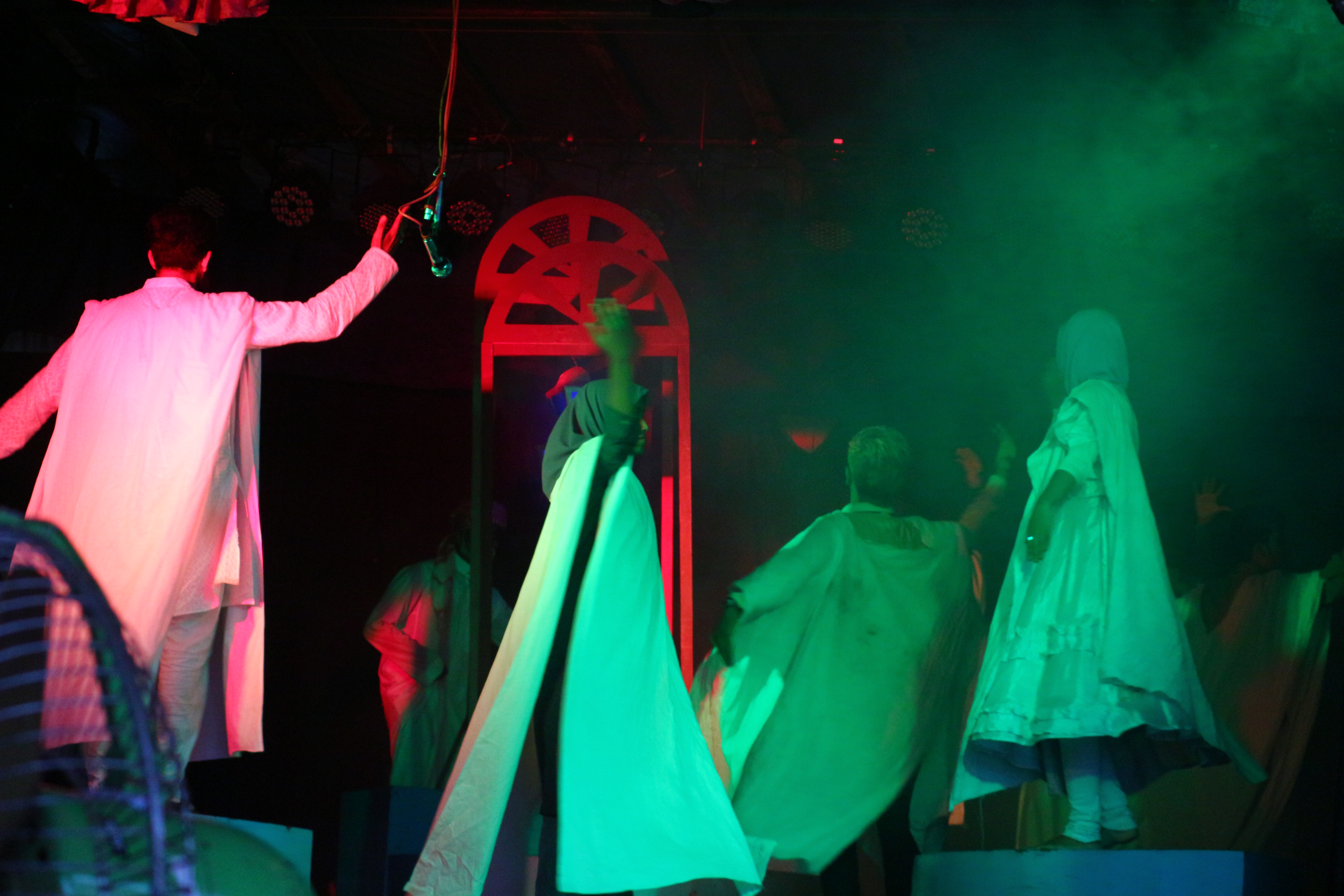
[With heart-felt thanks to Baheej Nalakath, Naseema, Jawad Hussain, Naseef Nanath, Harikrishna, Zahru, Arshad, Nadha, Naseera Ferhan, Hanish, Sahda, Jamsheel Aboobaker…]
Wow…..
Sprb…
Sufferings always open a door for introspection.